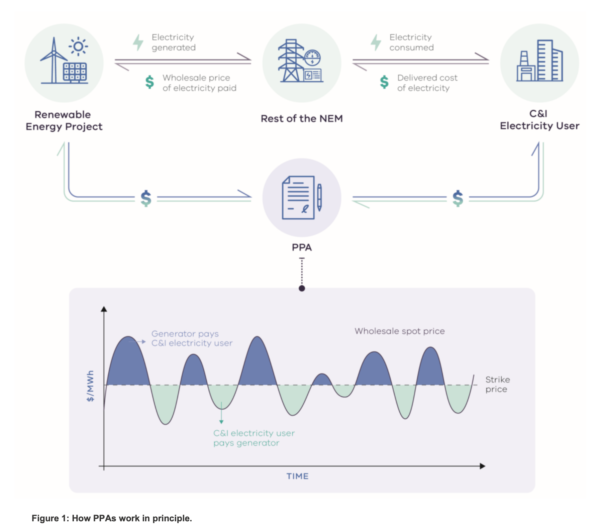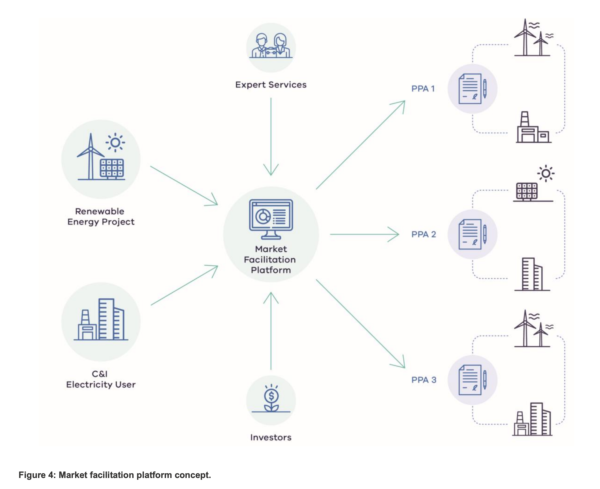The Victorian Government this morning launched a paper for consultation with business owners — commercial and industrial (C&I) energy users — to understand “how it can facilitate more competitive renewable electricity supply options” for this complex and diverse group. Its proposition is to create a market facilitation platform to provide C&I businesses with easier access to renewable energy contracts such as power purchase agreements, and thereby also facilitate expansion of clean-energy generation in Victoria.
“As we transition to renewable generation and storage, we want to understand the best way to create a more competitive electricity supply for businesses,” said Lily D’Ambrosio, Victoria’s Minister for Energy, Environment and Climate Change.
The Market Facilitation Platform Consultation Paper comes under the auspices of the Powering Business in Victoria program, which aims to attract and retain industry in the state by providing more competitive electricity prices and thereby boost employment opportunities.
It also has the dual and reciprocal purpose of transitioning businesses to renewable energy options which will stimulate a continued pipeline of renewable energy projects to replace retiring coal generation and mobilise the whole state toward its interim emissions reduction target of 45-50% below 2005 levels by 2030. (Victoria’s Climate Change Act 2017 set a net-zero carbon emissions target by 2050.)
The consultation on the value and potential structure of a market facilitation platform, “is an opportunity for everyone including businesses and renewable energy providers to share their perspectives on how to reduce barriers to accessing low-cost, clean electricity”, said D’Ambrosio.
Reducing barriers to the C&I energy transition
The paper recognises the diversity and variety of electricity needs of C&I businesses, including their level of demand and the times of day at which they have the greatest need for energy.
Installation of rooftop solar for behind-the-meter consumption by businesses is still low in Australia — 5% of C&I energy consumers have rooftop, compared to around 21% of homes — partly because many businesses don’t have the resources to devote to solar system development, many also don’t own their premises, or have the space or rooftop structure to support solar arrays, or perhaps they don’t have the ability to finance a solar installation for returns that extend over time.
A such, the Market Facilitation Platform Consultation Paper focuses on how to make power purchase agreements (PPAs) more easily accessible to businesses.
The PPA is an agreement between the buyer (typically described as the offtaker) and a renewable energy generator for the provision of electricity, either in a contractual of physical sense, with an agreed pricing structure over a fixed period of time.
For businesses, PPAs provide energy price certainty over the period of the contract; for the developer/generator, they offer certain revenue streams for part or all of the energy they will produce over the lifespan of a project and make it easier to secure finance.
For example BHP earlier this year signed a 10-year contract with Risen Energy’s Merredin Solar Farm in Western Australia for 20 MW of electricity to power its Nickel West Kwinana Refinery; and in August, it extended that PPA for a further 30 MW to be directed to BHP Nickel West’s Kalgoorlie Smelter.

Image: Victorian Government / DELWP
Other businesses, or offtakers, may be able to opt for ‘sleeved’ contracts for renewable energy through their retailer; where the retailer enters into a PPA with the renewable generator, and incorporates the PPA energy price into the retail tariff it charges the C&I electricity user.
Although the benefits of PPAs are that they have the potential to make energy more affordable for C&I users, as well as less volatile in cost, and cleaner in line with both business and government sustainability goals, the factors to consider in the purchasing of PPAs can be complex.
The Market Facilitation Platform Consultation Paper summary of barriers to the uptake of PPAs includes:
- A lack of industry capability to readily deal with the complexity
- A difference in PPA contract duration requirements between C&I electricity customers and renewable energy developers
- Administrative and transaction costs
- Uncertainty around quantifying risk: That is, the risk to business users of potentially not understanding the fluctuations of the energy market, and therefore paying too much for a long-term contract.
- Insufficient C&I load size: small-to-medium-sized C&I business may not have a large enough electricity demand to be able to negotiate an attractive PPA price that also covers the transaction costs of the deal.
What would the MFP provide?
The Victorian Government proposes that a Market Facilitation Platform, could “share information about new and existing renewable energy projects and facilitate financial and contractual relationships between renewable energy suppliers, C&I electricity users, retailers and investors seeking to enter PPAs” and provide other services such as:
- Provide standard contracts or contract terms that reduce “the cost of developing contracts from the ground up”.
- Provide market data and research to help participants understand the potential benefits and risks of entering into PPAs as opposed to alternative procurement methods
- Provide potential purchasers with easier access to administrative, legal and analytical support.

Image: Victorian Government / DELWP
How to participate in the consultation
The Victorian Department of Environment, Land, Water and Planning (DELWP) invites interested parties to respond to the Market Facilitation Platform Consultation Paper by Friday November 26.
The paper itself poses a number of questions that will help businesses in particular formulate a submission. Or participants can choose to fill out a brief survey (at the bottom of this page), responses to which will also inform the state government’s next steps.
DELWP is also holding three online information briefing sessions in October (same content, different times) at which it will provide an overview of the process and the issues, and answer questions.
The state government summarises its Powering Business in Victoria strategy as “leveraging Victoria’s global competitive advantage in renewable energy … to make it easier and more affordable to do business in Victoria” — the more feedback it receives on it’s MFP paper, the more its response will reflect commercial energy users’ true needs.
This content is protected by copyright and may not be reused. If you want to cooperate with us and would like to reuse some of our content, please contact: editors@pv-magazine.com.









2 comments
By submitting this form you agree to pv magazine using your data for the purposes of publishing your comment.
Your personal data will only be disclosed or otherwise transmitted to third parties for the purposes of spam filtering or if this is necessary for technical maintenance of the website. Any other transfer to third parties will not take place unless this is justified on the basis of applicable data protection regulations or if pv magazine is legally obliged to do so.
You may revoke this consent at any time with effect for the future, in which case your personal data will be deleted immediately. Otherwise, your data will be deleted if pv magazine has processed your request or the purpose of data storage is fulfilled.
Further information on data privacy can be found in our Data Protection Policy.